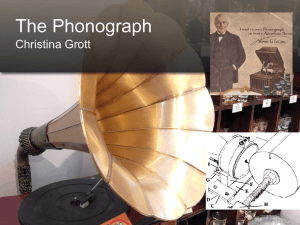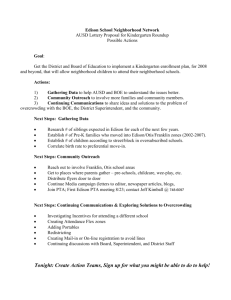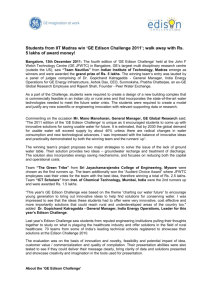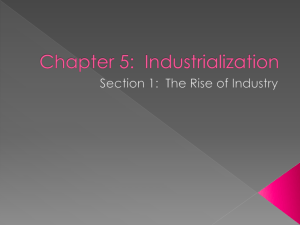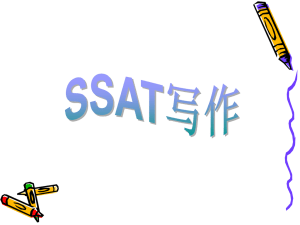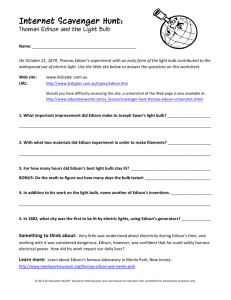Math Module II Review - Campbell County Schools
advertisement
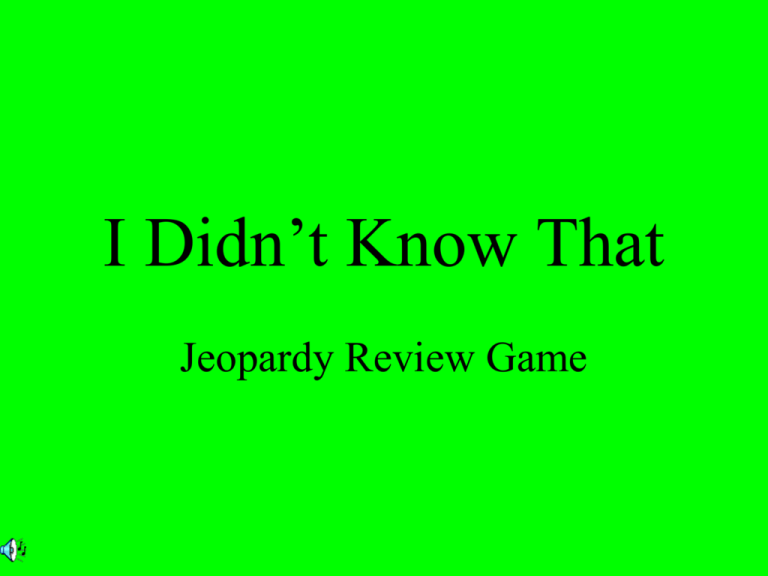
I Didn’t Know That Jeopardy Review Game Finding Evidence Central Idea Key Text Information Structure $1 $1 $1 $1 $1 $2 $2 $2 $2 $2 $5 $5 $5 $5 $5 $10 $10 $10 $10 $10 $20 $20 $20 $20 $20 Misc. The term that describes using what you know and what the text tells you What is making inferences? The proof to support ideas What is evidence? The types of questions that help readers make inferences What are the 5Ws and H (who, what, when, where, why and how)? After reading the article, “Lights, Camera, Invention,” what can be inferred? A. Thomas Edison liked the world just the way it was. B. Thomas Edison thought trying to change the world was impossible. C. Thomas Edison thought it was too much trouble to try changing the world. D. Thomas Edison thought people could change the world if they tried. What is D? Thomas Edison thought people could change the world if they tried. According to the article, which of Edison’s inventions allowed voices and music to be heard clearly? A. Phonograph B. Telegraph C. Lightbulbs D. Motion picture camera What is A? Phonograph – the evidence is clearly stated in paragraph 4. There is no evidence to support that people could hear voices or music on the motion picture camera Edison invented. The article does not mention the telegraph. The light bulb does not make sense. Which of the following is true of central idea? A. The central idea of a text is found in the first sentence. B. The central idea of a text can be written in one or two words. C. The central idea of a text is supported by details throughout the piece. D. The central idea is found in one specific section of the text. What is C? The central idea of a text is supported by details throughout the piece. True or False: The main idea is not always directly stated in a text. True – Sometimes it is up to you to figure out the main idea by examining the information and determining what the writer most want you to know about the topic. Explain the difference between a topic and a central idea. A topic is what the piece is about, and can usually be stated in one or two words; a central idea is the most important idea the writer wants to get across about the topic, and it is written as a statement. What is a central idea of “Lights! Camera! Inventions!” a. Young Thomas Edison was bored. b. Thomas Edison invented the phonograph. c. Edison changed the world with his inventions. d. Many people dream of changing the world. What is C? Edison changed the world with his inventions. This answer is supported by details throughout the text. It is the most important point the writer wanted to get across. Which detail from the text supports the idea that Edison had a good imagination? A. He was supposed to be attending a concert in the park with friends. B. He rummaged through his bookcase until he found a story he liked. C. Soon, he was lost in a tale of pirate treasure. D. It was too bad the light from the oil lamp made it hard to see. What is C? Soon, he was lost in a tale of pirate treasure. This sentence shows that Edison could use his imagination to put himself into a story. Explain how to determine the key events in a story. The key events are the most important things that happen in the story. If you left out these events, someone would not understand what happened and/or the importance of the events. The term that is used for giving examples or evidence to support an idea. What is illustrating? Explain the difference between illustrating an idea and elaborating an idea. When you illustrate an idea, you provide examples or evidence for support; when you elaborate on an idea, you expand on the basics by providing additional information Which of the following is a key event used by the author to introduce the idea that Edison changed the world? A. The afternoon concert was cancelled. B. Edison imagined improved sounds, lights and pictures. C. People sat at home and listed to band music whenever they wanted. D. Edison made his dreams come true. What is A? The sentence first shows that Edison is imagining changes that will bring improvement to the world. What is the purpose of this sentence from paragraph 5? “Second, the lamp gave off a steady light, softer than the harsh brightness of the streetlight bulbs” a. elaborates ideas b. illustrates ideas c. introduces ideas d. utilizes ideas What is A? This sentence gives additional information beyond the basic explanation. Name 5 types of text structure studied in class this year. What are: compare and contrast, description, cause and effect, problem and solution and chronological order (sequence)? The graphic organizer commonly used when analyzing a compare and contrast text. What is a Venn Diagram? Which of the following key words would you least expect to find in a problem and solution text? a. dilemma b. solved c. similarly d. the main difficulty What is c? Similarly would usually be a signal for a compare and contrast text structure. “Lights! Camera! Inventions!” is organized by a. comparing and contrasting phonographs and motion picture cameras. b. identifying the problems Edison experienced to create the phonograph and explaining his solutions. c. chronologically listing Edison’s inventions d. describing how to construct each of Edison’s inventions What is c? The inventions are listed in the order in which they were invented. The other descriptions do not fit this piece. How does this sentence help develop ideas in the text? “Several years later, Tom Edison built the world’s first film studio so he could make movies for others to enjoy, rain or shine.” The sentence provides a detail about how Edison came up with the idea for movie theaters. b.The sentence shows the sequence of events by stating when Edison invented theaters in relation to the other inventions. c.The sentence compares different types of weather. d.The sentence provides the author’s opinion what a great invention Edison developed. a. What is B? The sentence begins with a time order transition so the reader can understand the sequence of events. Which sentence from the text best describes how a phonograph works? A. In the 1870s, he invented a phonograph, or talking machine. B. He found a way to record or copy sounds onto a thin, flat, round disk. C. People could sit at home and listen to band music whenever they wanted. D. For some people, these would have been enough bright ideas for one lifetime. What is B? This sentence explains the materials used to record sounds. Which piece of evidence does not support the idea that the lightbulb was better than streetlights? A. It was too bad the flickering light from the oil lamp made it hard to see. B. First, it was inexpensive because it used very little electricity. C. Many people could afford to use it in their homes. D. Second, the lamp gave off steady light, softer than the harsh brightness of the streetlight bulbs. What is A? This sentence does not refer to streetlights. It is in a different part of the text when Edison was using an oil lamp by which to read a book. The other choices are in the 5th paragraph where the idea of improving upon streetlamps is developed. Which of the following inferences could not be supported with evidence from the article? A. Edison liked to read. B. Edison liked to make life more enjoyable for others. C. Edison was a determined man. D. Edison felt communication was important. What is D? There is really no evidence in the text to support the idea that Edison valued communication. The other three ideas can be supported with evidence from the text. Which of the following statements from the text illustrates the idea that Edison continued to create inventions he was successful with the phonograph? a. Disappointed as he was, Tom wasn’t one to mope for long. b. What if they could see pictures of pirate ships on the ocean? c. Many people could afford to use it in their homes. d. In 1888, he invented the motion-picture camera. What is D? This statement gives an example of something that Edison invented after he invented the phonograph. Which of the following sentences would not belong in a summary of the text? A. Thomas Edison dreamed of changing the world. B. He enjoyed listening to band music. C. Edison used events in his life to create ideas for new inventions. D. Edison’s inventions have helped make the world a better place. What is B? This sentence is really not important to understanding the key ideas and events in the text. It is not necessary to know that Edison liked band music to understand the text. Final Jeopardy Answer The genre of texts we have studied in this unit. Final Jeopardy Question What is informational (or expository)?
